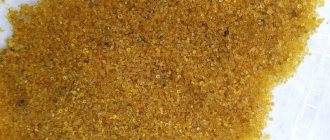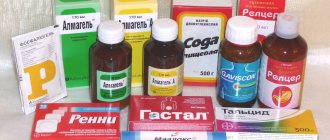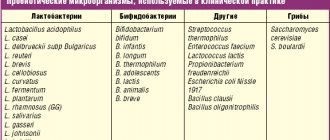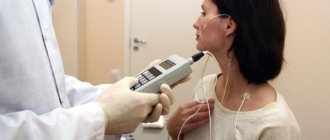Admission rules
For gastritis, drug therapy is carried out comprehensively. The disease must be treated with several drugs with different pharmacological properties. You should not use medications on the advice of friends. The inflammatory process is accompanied not only by general symptoms such as heartburn, belching, nausea and pain, but also differs in the degree of progression and the level of acidity of gastric juice.
Self-medication can cause complications.
When drawing up a treatment regimen, the following factors are taken into account:
- patient's age;
- special instructions (for example, pregnancy, lactation);
- acidity level of gastric juice;
- type of disease and degree of development;
- factors that provoked the disease;
- individual characteristics of the body;
- existing symptoms.
Treatment regimen
The amount of hydrochloric acid affects the acidity level of gastric juice. The action of certain medications is aimed at reducing or increasing the level of production of this substance. In addition, gastritis can have an acute or chronic form, accompanied by complications such as ulcers. For each of these conditions, a specific treatment tactic is used.
With low acidity
The treatment regimen for gastritis with low acidity is aimed at restoring the secretory function of the stomach. Antibiotics are used only when the disease is bacterial in nature. When selecting medications, the doctor takes into account the form of the disease. The atrophic type of the disease is accompanied by a violation of the structure of the glands. In the hypoacid form of the disease, the secretory function is blocked.
Treatment regimen:
- stimulating therapy (the main focus of the course of treatment is to increase the process of hydrochloric acid production);
- symptomatic therapy (medicines are used to eliminate nausea, heartburn, flatulence and other associated symptoms of gastritis);
- replacement therapy (the regimen is used when stimulant medications are ineffective).
With increased acidity
The general principles of treatment for gastritis with high acidity do not differ from standard therapy for other forms of the disease. The list of medications should include drugs to eliminate the cause of the inflammatory process, strengthen the immune system, and improve the functional state of the digestive tract. The main difference is the selection of medications to normalize the acidity of gastric juice. To reduce the production of hydrochloric acid, antacids and special blockers are used.
A mandatory addition to the course are drugs to accelerate tissue regeneration and have an enveloping effect.
In chronic form
The treatment regimen for chronic inflammatory process depends on the individual characteristics of the patient’s body. The doctor takes into account the acidity of gastric juice and accompanying symptoms. To prolong remission, vitamin complexes and medications can be prescribed to improve the functioning of the digestive system. Antibacterial therapy is carried out only during exacerbation of the disease.
Treatment of acute gastritis
In an acute inflammatory process, the main goals of therapy are to eliminate pain, destroy the causative agent of the disease, prevent complications and restore the functional state of the digestive system. The patient is prescribed antispasmodics, dopamine receptor antagonists, antibiotics, antacids, probiotics, and hepatoprotectors. The course of treatment must include astringents and enzyme agents.
Relief from an exacerbation attack should be carried out under the supervision of a physician.
For ulcers
An obligatory part of the treatment of an inflammatory process complicated by an ulcer is the prescription of proton pump inhibitors. Additionally, medications containing animal enzymes and histamine receptor blockers can be used. To prevent the spread of the inflammatory process, astringent and enveloping medications are used. Such remedies not only relieve inflammation, but also relieve the general symptoms of gastritis (nausea, vomiting, heartburn, belching, flatulence).
How to take medications
Some tablets must be chewed before swallowing. This action cannot be ignored and must be performed carefully. Patients with stomach ulcers take medications one hour before meals. In the case of antacid therapy, you need to drink about two liters of water per day. There must be a sufficient amount of it in the body.
It is recommended to store medications to reduce the acidity of gastric contents in a dry, dark and cool place. Preparations intended to neutralize acid should not be frozen. The dosage is indicated in the annotation for the product and must be agreed with the attending physician. In some cases, a specialist may prescribe a different treatment regimen. This may be caused by the patient having other ailments, and therefore the medicine for high acidity may be taken differently.
For nervous disorders during therapy, Atarax is prescribed in some cases. The drug has a moderate inhibitory effect on the secretion of gastric juices. In case of intestinal microflora disturbance, Hilak Forte is used. These drugs that reduce stomach acidity are very effective only in certain cases.
When taking antacids, the water-salt balance may be disrupted. Because of this, their use should not last longer than two weeks. During pregnancy, medications are prescribed only in exceptional cases. Some of the above drugs are contraindicated in children under 14 years of age.
When taking medications to reduce acidity, we must not forget about the importance of diet. The level of calcium and magnesium in the body is restored by consuming cereals and milk. This increases serotonin, the pleasure hormone. A good mood is of great importance for recovery.
What medications can you take for gastritis?
Treatment of inflammation in the tissues of the stomach involves the use of several groups of drugs. Medicines with different pharmacological properties complement each other, accelerating the tendency to recovery. There are many nuances to consider when designing a course. Incorrect therapy can cause complications. For example, if you take tablets to increase acidity when there is excessive production of hydrochloric acid, you will increase the risk of erosions in the stomach tissues.
Antacids
Antacids are in most cases prescribed for the treatment of gastritis, combined with increased acidity of gastric juice. When taking tablets of this group, you should take into account an important nuance - if you take the medicines on an empty stomach, their period of action will be shortened. Antacids eliminate symptoms of heartburn, belching, and improve the general condition of the digestive tract. Additionally, such drugs increase the protective properties of cells and tissues of the gastrointestinal tract.
Examples of antacids:
- Rennie;
- Maalox;
- Gastal;
- Alumag.
- If you have any symptoms of the disease, you should immediately consult a doctor. You can view a list of gastroenterology clinics on our website
- You will be interested! The article describes symptoms that make it possible to suspect the presence of liver disease in the early stages
- You will also be interested in learning more about the treatment of various diseases of the gastrointestinal tract
Antisecretory agents
The action of antisecretory drugs is aimed at blocking histamine receptors. Drugs in this group reduce the production of hydrochloric acid, protect the mucous membranes of the digestive tract from negative factors, and suppress an aggressive alkaline environment. The level of secretion decreases regardless of the reason that provoked its increase.
Additionally, antisecretory agents improve microcirculation processes.
Examples of antisecretory agents:
- Ranitidine;
- Omeprazole;
- Gastrocepin;
- Omez;
- Cimetidine.
Antibiotics
Antibacterial drugs are prescribed for infectious or bacterial inflammation. The disease can be caused by Escherichia coli, staphylococci, Helicobacter pylori and other pathogenic bacteria.
Antibiotics should not be taken without a doctor's indication. Improper use of such medications can aggravate the situation and provoke new attacks of the inflammatory process. Antibacterial drugs destroy pathogenic microorganisms and their metabolic products.
Examples of antibiotics:
- Clarithromycin;
- Tetracycline;
- Amoxicillin;
- Cephalexin.
Bismuth preparations
When treating inflammation in the stomach tissues, bismuth preparations have an antiseptic effect. These medications contain substances that relieve pain and stop inflammatory processes in the organ.
Bismuth-based products have an enveloping effect on the mucous membranes. Due to this effect, the protection of the tissues of the digestive tract from the effects of negative and irritating factors increases.
Examples of bismuth-based products:
- De-Nol;
- Vikalin.
Dopamine receptor blockers
Medicines from the category of dopamine receptor blockers are necessary to prevent and eliminate the symptoms of intoxication of the body. Such medications not only eliminate attacks of nausea and vomiting, but also reduce the risk of dehydration. For gastritis, dopamine receptor blockers are used as part of complex therapy. Taking these pills separately will not stop the development of inflammation.
Examples of dopamine receptor blockers:
- Cerucal;
- Raglan;
- Eglonil.
Selecting medications by acidity type
Medicines for the treatment of gastritis must be selected taking into account a number of factors. One of the main points is the acidity of gastric juice. If the level of hydrochloric acid production is increased, then the drugs should reduce it.
With low acidity, on the contrary, medications are used to stimulate secretory function.
Medicines to increase gastric acidity:
- means for regulating the acid secretion process (Acedin-Pepsin);
- enzyme agents to improve the process of breaking down food (Panzinorm, Mezim, Festal);
- drugs to stimulate gastrointestinal motility (Motilium).
Medicines to reduce gastric acidity:
- means for stopping inflammatory processes (Pariet, Omez);
- drugs for pain relief (No-Shpa, Atropine);
- means to slow down the production of hydrochloric acid (Rennie, Alumag);
- medications to improve regeneration processes and protect mucous membranes (Omez, Omeprazole).
Normalization of low acidity
For people who suffer from low pH, the following products will help solve the problem:
- Drinks made from sea buckthorn and rosehip.
- Fresh grapes and apricots.
- Different types of beans.
- Fresh cabbage.
You can make a variety of dishes based on these products. Cabbage makes a tasty and healthy stew, and beans are easy to puree. You can also simply add it to salads. It is advisable to eat berries before meals so that they have time to prepare the digestive system for the upcoming load.
Which pills are better?
Tablets for gastritis differ in the name of the manufacturer and in price. Some patients prefer expensive products, others try to choose cheap analogues. Price and manufacturer don't matter. The main rule of treating a disease is a correctly designed treatment regimen. The drugs must complement each other and mutually enhance their pharmacological properties.
Nuances:
- taking any pills should be agreed with a gastroenterologist;
- if you take the pills incorrectly, you may develop drug-induced gastritis;
- the effectiveness of drug therapy will decrease if additional recommendations are not followed (balanced diet, avoiding stressful situations, giving up bad habits).
Contraindications
General contraindications for taking most tablets for gastritis are childhood, individual intolerance to individual components of the drugs, lactation or pregnancy. If you have serious problems with your liver or kidneys, you should consult your doctor. The specialist will select safe analogues of medications or adjust the dosage regimen.
Gastritis during pregnancy requires special treatment regimens. In some cases, doctors delay drug treatment until after the baby is born.
Prevention
Improper treatment of gastritis can cause the disease to become chronic. To exclude such a factor, special preventive measures should be taken. The body must receive a sufficient amount of vitamins. To achieve this task, it is necessary to adjust the diet and take vitamin complexes. If symptoms of the disease recur after therapy, then self-medication should be excluded.
Additional preventive measures:
- avoiding overeating or prolonged fasting;
- compliance with the rules of a balanced diet;
- rejection of bad habits;
- maintaining a healthy lifestyle;
- regular examination by a gastroenterologist.
Video on the topic: What medications to take for gastritis.
Folk remedies
There are a huge number of recipes for the treatment of gastritis in folk medicine. The products are often used in combination with medications.
Increased acidity:
- Warm milk;
- Sunflower seeds, pumpkin seeds;
- Potato, carrot juice;
- Sweet apple;
- Homemade yogurt;
- Decoction of flax seeds, rice;
- Sea buckthorn oil;
- Tea with chamomile, mint, lemon balm;
- Butter;
- Banana;
- Melon;
- Watermelon;
- Baking soda on the tip of a knife;
- Raw chicken, quail egg;
- Mineral still water.
Folk remedies have an enveloping property, protect the mucous membrane from further irritation, facilitate the digestion process, stop inflammation, relieve pain, reduce acidity, and improve overall well-being.
Low acidity:
- Milk with honey;
- Nuts;
- Raspberries;
- Strawberries;
- Strawberry;
- Citrus;
- Cabbage juice;
- Decoction of flax seeds, rice;
- Tea with thyme;
- Rose hip decoction;
- Natural lemonade;
- Still mineral water;
- Low-fat cottage cheese;
- Fruit juice with sourness.
To normalize the functioning of the digestive tract, you need to ensure frequent drinking and eating about 6 times a day in small portions. Folk remedies speed up the healing process and prevent relapses.











